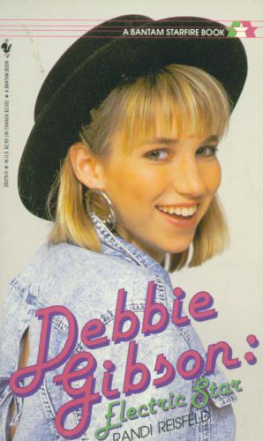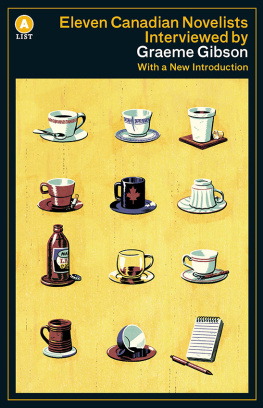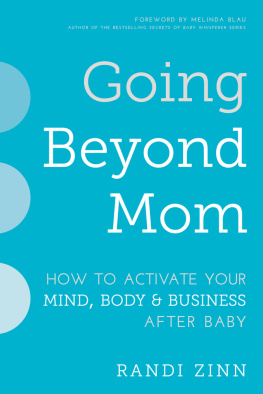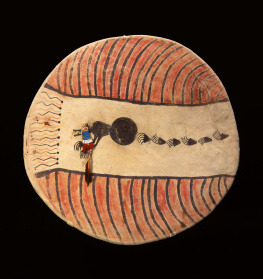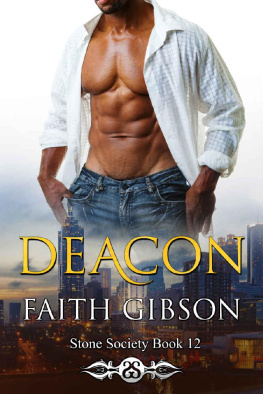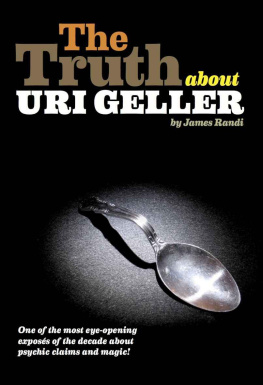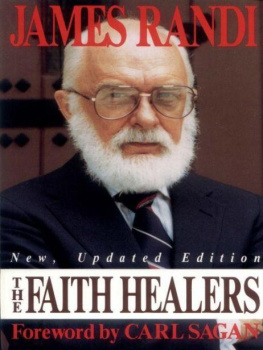Randi Reisfeld - Debbie Gibson: Electric Star!
Here you can read online Randi Reisfeld - Debbie Gibson: Electric Star! full text of the book (entire story) in english for free. Download pdf and epub, get meaning, cover and reviews about this ebook. year: 1990, publisher: Starfire, genre: Non-fiction. Description of the work, (preface) as well as reviews are available. Best literature library LitArk.com created for fans of good reading and offers a wide selection of genres:
Romance novel
Science fiction
Adventure
Detective
Science
History
Home and family
Prose
Art
Politics
Computer
Non-fiction
Religion
Business
Children
Humor
Choose a favorite category and find really read worthwhile books. Enjoy immersion in the world of imagination, feel the emotions of the characters or learn something new for yourself, make an fascinating discovery.
- Book:Debbie Gibson: Electric Star!
- Author:
- Publisher:Starfire
- Genre:
- Year:1990
- Rating:3 / 5
- Favourites:Add to favourites
- Your mark:
- 60
- 1
- 2
- 3
- 4
- 5
Debbie Gibson: Electric Star!: summary, description and annotation
We offer to read an annotation, description, summary or preface (depends on what the author of the book "Debbie Gibson: Electric Star!" wrote himself). If you haven't found the necessary information about the book — write in the comments, we will try to find it.
Debbie Gibson: Electric Star! — read online for free the complete book (whole text) full work
Below is the text of the book, divided by pages. System saving the place of the last page read, allows you to conveniently read the book "Debbie Gibson: Electric Star!" online for free, without having to search again every time where you left off. Put a bookmark, and you can go to the page where you finished reading at any time.
Font size:
Interval:
Bookmark:
The author expresses her gratitude to:
Brian Bloom, Cecelia Brauer, Doug Breitbart, Dr. Ben Cuiffo, Dr. Ron Deck, Iris Eplan, Morton Esttin, Maralyn Fisher, Melissa Fogarty, Gary Goreels, Para and Scott Grimes, Pat Hall, Estelle Hoffman, Mildred Hohner, Barry Lather, Jennifer Left, Paula Lindstrom, Robert Marks, Melissa Nadler, Guen Oraeton, Brian Robbins, David Salidor, Sandy Sandoval, Ina Wallman, Debbie and Wil Wheaton, Larry Yasgar, Jerry Zaback, and a few whose names will never see print.
Also, thanks to Beverly Horowitz for making it a "real deal,"
to Hedy End, Chris DiNapoli and the staff of 16 magazine for their support, to my family of friends (you know who you are) for their constant encouragement and advice, and to Mike Mandelbaum, the computer doctor.
Always, with love to M., S. & S.
And thank you, Debbie, for being who you are!
Debbie Gibson is the spitting image of the teen next door, as her blond ponytail bounces atop her head and her big denim jacket flops over her frayed-at-the-knees jeans. She's cute, not beautiful, open and accessible, not remote, more earthy than exotic.
Debbie is as clean-cut and refreshingly wholesome as a cool breeze that cuts through a hot summer's day. And she really is what she appears to be. She really is a bright-eyed, bubbly teenager who loves to shop for hot new clothes and bop around town in her too-cool convertible. Her room really does , as her mom good-naturedly complains. "look like a grenade exploded in it," and she really can talk on the phone for hours with her girlfriends. For all the world, she could be any one of the lookalike teen queens cruising the mall on a Saturday afternoon. Except, that is, for one tiny thing.
She's not exactly anonymous anymore, and she can't exactly go to the mall on Saturdays anymore: she'd be mobbed! For Debbie Gibson is a true-blue pop rock sensation, and every girl in America knows exactly who she is and what she looks like!
Debbie Gibson is not exactly your ordinary girl next dooreverything about her is, and always has been, rather extra ordinary. By the time her eighteenth birthday rolled around, she'd already recorded two smash albums, had eight Top 10 hit singles, and sold over six million records. In the process, she'd set plenty of records, landing in the pop history books as the first female teenager to record, produce, and perform two Number 1 hits. Then she became first in her class to top the Hot 100 Albums chart and the Top Pop Singles chart at the same time.
She'd performed live on stages all over the world for thousands of feverish fans and played hostess on TV's American Music Awards for millions more. She'd been named national spokesperson for a famous line of cosmetics and even had a new perfume named after one of her songs.
The statistics are imposing, but they don't come close to telling the Debbie Gibson story. Hers is two stories. There's Debbie Gibsonthe sweet, wholesome purveyor of pop tunes who breezed onto the music scene seemingly "out of the blue." And Deborah Gibsonthe serious, driven classically trained musician who left no stone unturned in her quest for stardom. This is the story of both of them.
Debbie Gibson was born to be a star. By the time she was two, she knew it; by the time she was five, her parents knew it, too. The third of Diane and Joe Gibson's four daughters, Deborah Ann was different right from the start. Born on August 31, 1970, the brown-eyed baby with the reddish-blond hair was unspoiled and sociable. She liked the laughter and closeness of her family. She was a real people person.
What set her apart from her older sisters, Karen and Michele, however, was her inborn love of, and quick ear for, music. Whenever the radio or stereo was on, little Debbie seemed to really come alive, clapping and twirling, keeping perfect time with the music all around her.
By her second birthday, Debbie was walking, talking, and even singing. She could express herself well enough to make her wishes knownand what little Debbie wished for was not a doll, nor a puppy, nor a tricycle: the barely-out-of-diapers toddler wanted a guitar.
While that request might've startled other parents, it didn't really daunt Diane or Joe Gibson. What's more, they even tried to fulfill it. But because Debbie's hands were just too tiny to handle the instrument, they bought her the next best thinga child-size ukulele. Debbie took to it immediately, and it became her favorite toy. Debbie's parents have always loved music, and each, once upon a time, secretly wished to make it a big part of their lives.
Debbie's mom, Diane Pustizzi, grew up in Brooklyn, New York, in the 1950s. Like so many girls of her generation, Diane used to listen to the radio and drool over the teen crooners of the day, whose sentimental love songs wafted over the airwaves. Her special favorite was Paul Anka, because he was close to her own age and sang about things she could relate to. Diane did not dream of a singing career for herself; she did, however, have a burning desire to learn to play the piano. Her parents, Al and Josephine, did not own a piano and reportedly weren't convinced Diane was really serious about wanting lessons. "I know you're not gonna practice" was a refrain Diane would often hear when the subject came up.
Although she wasn't to get her piano, Diane did not become angry or bitter. She understood and simply decided to defer her dream, determined, however, that one day she would have a piano. One day she would learn to play.
As she advanced through her teenage years, Diane thought she might go to college and become a teacher. She might well have gone and done just thatif love had not come along and happily interrupted her plans.
Joe Gibson had grown up in a decidedly different environment than Diane hadthough not very far away. A boy with no family, the baby-faced youngster spent his early years in nearby Rockaway Park, Queens, New York, in the St. John's Home for Boys, a 150-year-old facility supported primarily in those days by the Catholic church. Joe's heritage was part Italian. He got his blond hair and fair complexion from the German side of his family.
Although Joe Gibson had few luxuries in his youth, he did have a gift for song and a love of music as strong as his future wife's. Ironically, Joe had even more of an opportunity to indulge in his passion. At twelve years old, the sweet-voiced youngster became part of a barbershop quartetfour boys from the orphanage who dubbed themselves the Four Peanuts. With the help of the home's leader, the Four Peanuts polished their harmonies and began performing in front of audiences. Not quite professional singers, they did, however, earn some small success singing on TV's Name that Tune , at several Bob Hope USO tours, and even on The Ed Sullivan Show . For a time, it looked as if the Four Peanuts might have a real future as professional entertainers, but they never made it that far.
As each boy turned eighteen, the need to have a marketable skill and make a living was ever more pressing. Since they weren't truly related, the group disbanded. Each Peanut went his separate way, leaving the dream of musical success behind, a sweet, melodic, but increasingly distant memory.
Joe got a job at a nearby airport with a major international airline. It was a good job, offering security, opportunity for advancement into managerial ranks, andas he'd eventually find most importantflexible hours. He could work nights and be available during the day. That flexibility would one day prove invaluable.
It wasn't long after Joe started working that he met Diane Pustizzi and fell in love. The young couple, who shared, among many other things, a profound love of music, knew instinctively they'd soon be married. And so they wereDiane was barely eighteen years old at the time; Joe not much more. The newlyweds settled in Brooklyn, not far from Diane's ecstatic parents. And, as was common back in 1965 for a young couple of their heritage and backgrounds, Diane and Joe began planning a family. They hoped for a large brood of their own and the very next year had their first child, a blond baby girl they called Karen. Diane and Joe, with their extended family close by, adapted well to parenthood. In fact, they reveled in it.
Font size:
Interval:
Bookmark:
Similar books «Debbie Gibson: Electric Star!»
Look at similar books to Debbie Gibson: Electric Star!. We have selected literature similar in name and meaning in the hope of providing readers with more options to find new, interesting, not yet read works.
Discussion, reviews of the book Debbie Gibson: Electric Star! and just readers' own opinions. Leave your comments, write what you think about the work, its meaning or the main characters. Specify what exactly you liked and what you didn't like, and why you think so.

